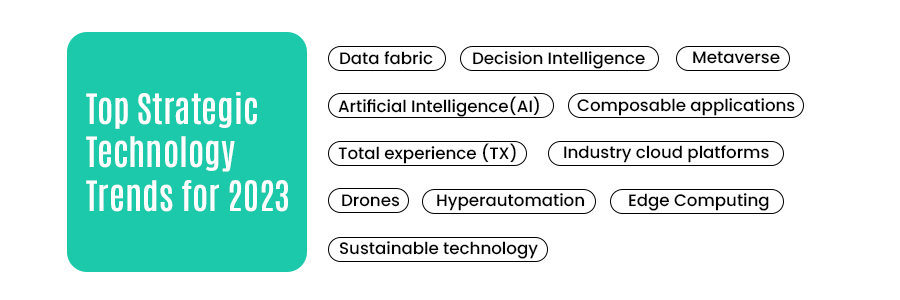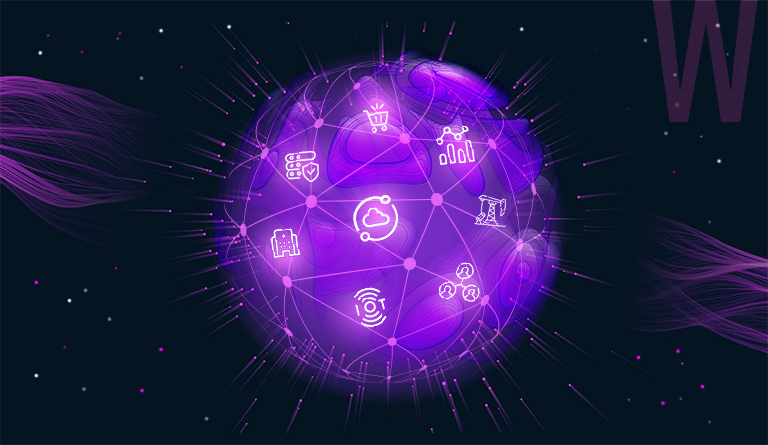Instinctively being digital is how companies can have an edge over the market.
In the current landscape, every business is a digital business, so defining the edge that separates yours from the rest of the bunch has become increasingly difficult. Companies are getting creative when it comes to leveraging technology, and when we say leveraging technology, it doesn’t always mean subscribing to the idea of a full-blown, core-tech approach. For sure, a robust and more ingrained tech strategy will enable your business at various levels, but in the end, all that matters is delivering value to your customers. As the ground is leveled, your edge is when you identify opportunities faster and more effectively. When going digital is the new normal, focusing on consistency in delivering value to your customers can help you stand out.
Our strategic tech consultants and digital transformation experts have identified the following trends in the tech space that a business can leverage to maximize the impact of its digital strategies.
Feel free to check out this insider list of top strategic technology trends for 2024

-
Data fabric:
One cannot stress the significance of data enough, as the purpose of the digital medium has become to collect and leverage data. With technologies like IoT making “digital” accessible across the global population and 5G establishing smoother communication channels, we are producing more data than ever!
We are running out of effective methods and tools to analyze such huge volumes of data and convert it into useful insights for the data consumers– be it business/consumer. Enter Data fabric, simplifying the whole process of data integration across various touchpoints to provide a holistic data-driven strategy for organizations. Data fabric is said to increase effective data leveraging by many folds very soon.
But what gives data fabric the edge over the traditional data approach is that a data fabric system utilizes automation and intelligence systems, therefore drastically cutting the dependency on humans.
-
Decision Intelligence:
The pressure on businesses to look further into the future is real! Not only that, but these future-proof decisions must also solve the problem at hand. It should also not cross a line ethically; even a mediocre decision could severely impact the brand image and trust among consumers.
So, yes! Decision intelligence will be an influential trend, if only it’s not one already! By bringing more context to an event, decisions can be more grounded yet look into the future. Based on the foundational principles of data science, decision intelligence can be a way for business leaders to overcome decision fatigue!
The intense data and digital strategies of businesses allow easy implementation of decision intelligence. Brands can leverage their existing infrastructure instead of starting from scratch. Our industry experts say that innovations like decision intelligence bring us closer to the future, like cognitive cities, advanced VR and AR implementations, etc. Since the impact of technology on enterprises has become a key success factor, it will not be too long before brands adapt to such changes.
-
Metaverse:
Metaverse is the start of a new era that brings the digital and physical worlds together. Digital Business Assets or DBA, are created to enhance a business’s capabilities in the virtual environment. Much like our reality, Metaverse will be a place where users can explore and experience brands, providing vast economic opportunities for businesses. Moving forward, businesses have to include metaverse in their digital transformation strategy, and skipping this would be a huge miss for businesses to tap into a wider audience base. This could also open up completely new verticals for businesses, allowing you to engage and interact with audiences from across the globe.
-
Artificial Intelligence(AI):
From enabling interactive voice assistants to tracking pandemics, AI is already being used in various industries and government agencies. However, the scope of AI will drastically increase by the end of this year.
With not much time left for countries to achieve their 2030 Sustainable Development Goals, international alliances face real pressure to battle climate change, among other serious issues. Since the COVID pandemic, governments are reinforcing their conventional methodologies with modern technologies like Artificial Intelligence (AI) to increase their overall efficiency in surveillance. So, it is more likely that AI penetration will be deeper in the public sector in the next few years.
Our industry experts also believe that AI will be democratized, among many other technologies. Businesses, irrespective of their size and firepower, will be able to infuse Artificial Intelligence (AI) with their services. It is also expected that AI will fuel the arrival of “smart” retail chains by contributing heavily to automated systems, supply chain management, planogram analysis and compliance, and a lot more!
The overall AI pipeline will be streamlined to increase the effectiveness of the technology. This will not only diversify AI but other platforms and technologies where it will be integrated. The impact of technology on governments, too, will increase in the coming years.
-
Composable applications:
From startups to enterprises, applications drive an organization’s digital capabilities- whether internal or external. However, building one from scratch means spending a vast amount of resources, including the most crucial resources of an organization- time and effort!
Enterprises are increasingly shifting to the composable environment as technologies like the cloud open them up for better opportunities to integrate various capabilities. Basically, the idea of composable applications is to build an application made of multiple blocks or microservices so that it can be moved or removed according to the business requirements. This not only allows businesses to scale easily but also allows them to save manual effort and the costs around it.
The main attraction of a composable application is the agility and flexibility it brings to an organization. In an increasingly digital climate, companies are stuck on resource management and enabling effective collaboration between their internal departments; composable applications allow them to move complex functionalities like play blocks. Our industry experts strongly believe that the future will only consist of composable applications, and conventional approaches to applications and digital functionality will become obsolete.
-
Total experience (TX):
Though Total experience or Tx is more of a business strategy, the tech will be the binding force between the organization and the implementation of Tx. The future of enterprise digital transformation will revolve around Tx.
Total experience, as the name suggests, aims to bring a variety of experiences in an organization together for holistic growth and easy scalability. As digital empowers an organization by allowing various stakeholders to come together, Total experience moves them towards a singular vision. Managing customer experience, employee engagement, crafting a better brand image, devising marketing strategies, managing the consumer community, and much more can be managed through Total experience.
Brands, enterprises, and even government organizations are moving towards the goal of Total experience to better optimize their system. The end goal is to bring synchronization among different departments within the organization.
-
Industry cloud platforms:
Though the cloud has empowered industries by simplifying their operations, industry-specific cloud platforms will be a game changer as we advance further. It brings everything that the cloud brings to the table, but industry cloud platforms are more aligned toward tackling the specific challenges any particular industry may face. They are strategically built to catalyze business operations for a specific industry by harnessing the digital framework, allowing businesses in that industry to be more efficient and effective. Industry cloud platforms could also mean that innovations in that particular industry would now be more feasible, and a variety of niche tools could enter the market that solves the greater problems existing in that industry. However, to make this transformation, a business must first be cloud-ready. Here’s everything a business needs to know about cloud computing.
-
Drones:
Though drones have been in the market for a long time, digital reinvented them, expanding their capabilities in a major way. And many core industries like construction, real estate, energy, agriculture, mining, etc., are incorporating drones into their strategies to simplify their operations. With enhanced hardware capabilities, cutting-edge tech like infrared sensors and thermal indicators can be mounted on them. With drones, businesses can now survey an area in hours or days which would’ve otherwise taken months or even years. With edge computing capabilities, drones can not just collect data, but also transmit them to a nearby source almost instantly.
-
Hyperautomation:
The idea of hyperautomation is to automate everything within an enterprise that is automatable. The epidemic has aided the enterprise’s adoption and acceleration of hyperautomation and digital twin, elevating initiatives like automation and digital transformation in the hierarchy of importance. Hyperautomation reduces the load that repeated operations and outdated infrastructure place on an organization and its resources because of the distributed nature of the modern enterprise.
-
Edge Computing:
Enterprise applications are brought closer to data sources like the Internet of Things (IoT) devices or local edge servers using edge computing, a distributed computing architecture. For enterprises, being close to the data source can have many advantages, such as increased bandwidth availability, data literacy, quicker turnaround times, and insights. Using planogram analysis and edge computing for retailers, enterprises can fully leverage the enormous volumes of untapped data created by linked devices.
-
Sustainable technology:
Building a sustainable future is without a doubt one of the biggest challenges of this decade, and technology as a whole will be a crucial tool/platform to make it happen. So, it’s important for the tool to be efficient and energy conscious to truly enable sustainability. For example, technologies like the cloud are more energy efficient than conventional data centers, making tech more sustainable. Furthermore, leveraging sustainable technologies will embed the values of sustainability in digital enterprises, naturally aligning the solutions they provide towards this greater vision.
Check out our tech services here!
Connect with our strategic consultants
Capitalizing on these emerging technology trends for 2024 will help your business be more aware of the market movement, and stay on top of it, too! But one of the common mistakes that businesses make is that they think of technology as a separate entity from their core operations. Technology must be a part of your core business model for you to deliver value with it. And as technology evolves, your approach to technology should also do so. As a leading digital transformation consulting firm, we will help you integrate these top technology trends into your business, and amplify your existing digital capabilities. And that’s the launchpad from which your business will scale towards the future.
“W2S Solutions has been recognized as one of Austin Software Development Companies by DesignRush”


